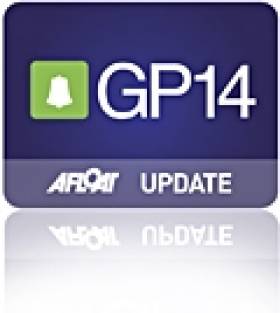Displaying items by tag: EDYC
#GP14World – There's less than a month to go before the start of the GP14 World Championships to be held at East Down Yacht Club.
This biennial event will see one of the biggest fleets of single class twin crew dinghies assemble in Northern Ireland this year. With an international following the event has attracted around 200 competitors (Helm and Crew) some from as far away as Australia. Hosted by East Down Yacht Club (EDYC) the event will take place on Strangford Lough with races being held daily over the week-long event. The main sponsor of the event is Down District Council with Exe Sails the title sponsor and to mark their involvement Exe Sails are offering a promotional discount on their GP14 Sails especially for the event.
With previous World Championships being held in locations such as Sri Lanka (2011) and future Championships planned for Barbados (2016) this it is a brilliant opportunity for Northern Ireland to showcase Strangford Lough and the surrounding area. Designated as an area of outstanding natural beauty and an area of special scientific interest, Strangford Lough is one of Northern Ireland lesser known "Hidden Gems" Strangford Lough while almost totally landlocked is completely tidal, providing a sanctuary for seals, porpoises, terns, horse mussels, and many other species of wildlife. With moderate currents and sheltered from ocean swell, the mid-lough provides some of the best waters for dinghy racing anywhere in the world.
The Exe Sails GP14 world Championship event will consist of two races held each day, and with approximately 100 boats jostling for starting position this should make for some fantastic and exciting racing. This will be an amazing spectacle especially when the fleet has hoisted their multi-coloured spinnakers on "a run" between marks. Prizes will be awarded daily and on the final Friday the Grand Prizes will be awarded prior to the Gala Dinner event held at EDYC.
Much preparation has been ongoing behind the scenes with volunteer teams dedicated to logistics, accommodation and catering for both competitors and organisers. A dedicated fleet of around 10 safety boats (RIBs) will also be on the water each day, all of which should provide for a smooth successful safe and enjoyable event.
The good news is it's not too late to enter as the closing deadline has been extended to the 1st August 2014 Application forms are available from the GP14World Face Book or East Down Yacht Club web site. Each Crew will be given a registration pack on arrival and having seen a sneak preview there are some nice goodies in there.
Lying in the shelter of Taggart island, a couple of miles north of Killyleagh at the south end of the lough, East Down Yacht Club provides will provide superb facilities for the expected 100 plus GP14s, with hard standing for 150 dinghies, a wide gentle slip, bar and dining facilities, along with grounds for camping this will be one great event. Contact East Down Yacht Club directly for accommodation availability at the club or at nearby facilities.
The GP14 Dingy was designed by Jack Holt in 1949. The idea behind the design was to build a General Purpose (GP) 14-foot dinghy which could be cruised, raced or rowed, capable of being powered effectively by a small outboard motor and able to be towed behind a small family car and able to be launched and recovered reasonably easily. Such was the effectiveness of the design the GP14 Class has continued to this day with active fleets in the UK, Ireland, Australia, South Africa, Sri Lanka and parts of north-eastern USA.
For more information and promotional offers, along with daily race results, photographs and video of each day's events you can follow the 2014 GP14 World Championships on twitter @GP14World or on Facebook at www.facebook.com/groups/gp14world






























































